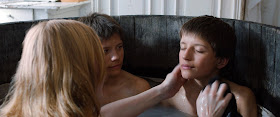A pair of attractive young twin boys graces THE NOTE BOOK, but anyone who mistakes this film with the movie crafted from the sentimental, sodden Nicholas Sparks novel will probably go running from the theater within a very few minutes. This newer Hungarian film traces the lives of these twins, once they have been sent off to the country to live with Grandma, after Hitler's troops have entered Hungary and begun despoiling it.
Using twins as its main characters to bring the point of the novel and film home was a fine idea because of the nature of twins: to be so firmly rooted one to the other that no other character could in any way exist to pull the pair apart. Had the "hero" of the tale been a singular character, he (or she) might have looked to another, older, wiser person for guidance here.
The twins (above) have each other, and together they determine to learn how to survive by watching and aping their "masters" -- who are in this case their truly horrible grandmother (below) and the Nazis who overrun the country. (That's the fine Danish actor, Ulrich Thomsen, shown two photos below as the leading German officer.)
If you are imagining that this scenario would result in one of the bleakest, ugliest portraits of WWII to so far make it to the screen, you'd be on the mark. One of the pair writes what they have learned in that "notebook" of the title (the film even uses the French title of the international best-seller on which it was based, Le Grand Cahier, as a kind of recognizable subtitle), which we see from time to time.
Mostly we see the horrors of wartime brought home in a somewhat different manner, as our twins stand up to their oppressors by hardening their bodies, minds and hearts. This leads to perhaps the most shocking, deadening finale you will have encountered -- even in the overrun realm of WWII and Holocaust films.
While I refer to the Holocaust, The Notebook is not really a Holocaust movie, as the twins are not Jewish, and neither are most of the characters we see and meet here. The one scene of Jews being rounded up, and a young girl the twins become involved with (above and below) ratting out a local shoemaker as Jewish, is well done but somewhat peripheral. (Later we see smoke rising from the camp chimneys.) And because the movie jumps so often and so quickly from incident to incident, we get no real sense of what the shoemaker meant to the twins. We are told, but we don't see.
These incidents do not necessarily grow more horrible as they go along (they're dreadful from the get-go), and yet in terms of wartime humiliation, they cannot help but finally appear that way.
How war dehumanizes a population is the major theme here, as shown us via the twins. Not that certain members of that population were not already plenty dehumanized (Grandma, for one). But how our boys lose all shred of humanity until their final shocking act -- which, not incidentally, I think, allows them to "grow" in a certain way that they have, until now, denied themselves.
What kind of growth this is, however, you will have to decide for yourself. Becoming autonomous has rarely been shown us in quite this kind of manner.
Whether or not you'll want to put yourself through the toils of this particular Notebook is an interesting question. The film is certainly well-done of its kind, yet what it adds to our history of World War II, I am not certain. The twins (newcomers László Gyémánt and András Gyémánt) give as good a performance (for untutored actors) as you could wish, even if their expressions seldom vary, and they never seem to outgrow their matching sweaters over the course of the war.
Supporting performances are on the mark, as well, with Granny (Piroska Molnár) especially good, while the twins' mom (Gyöngyvér Bognár, shown above and below) and dad (Ulrich Matthes) are in fine form to show us the before and after of that particular generation during WWII.
From Sony Pictures Classics, The Notebook (Le Grand Cahier) opens this Friday, August 29, in New York (at the Quad Cinema) and Los Angeles at Laemmle's Royal. The following Friday it will expand in the L.A. area to Laemmle's Town Center 5 and Playhouse 7.











No comments:
Post a Comment